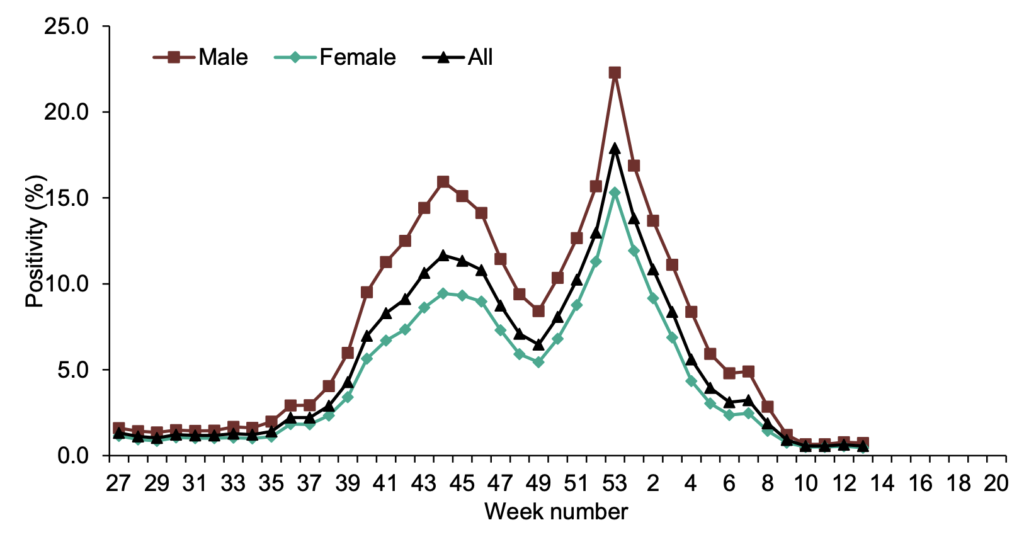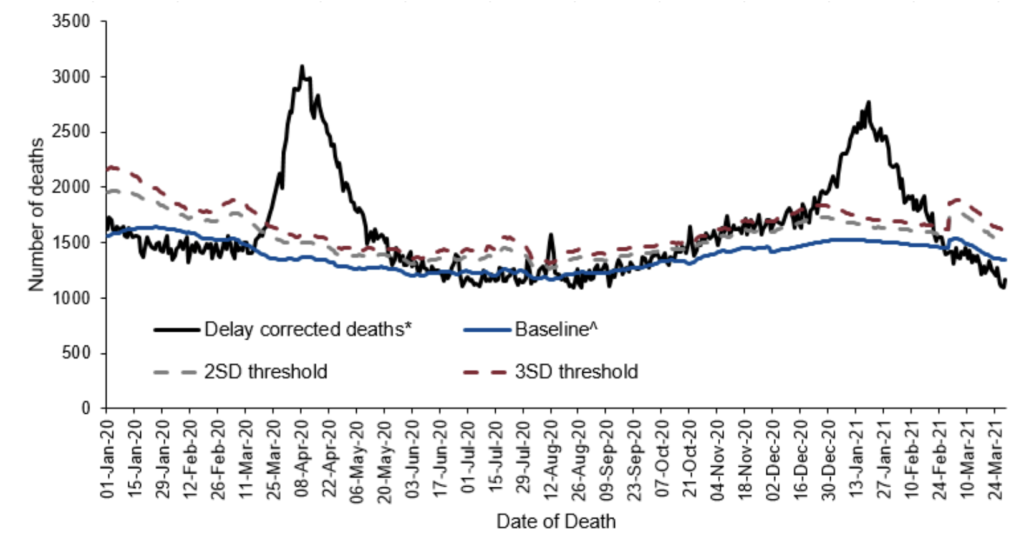Restrictions pose more of a threat than COVID-19
After several weeks of minimal cases being found in the community and weekly deaths below normal levels we are still locked down. Lockdown costs us about £500m a day and every day brings more businesses to the brink. Over 4.7 million people are now waiting for NHS operations. Between March 2020 and January 2021 there were 350,000 fewer cancer referrals to hospitals than expected, a shortfall which is still growing. Education is still being interrupted with universities not returning to face-to-face teaching until 17 May.


Vaccine certification
The opposition to ‘Covid status certificates’ continues to grow this week, with the news that over 1,000 Christian leaders and counting have signed an open letter to the Prime Minister detailing their concerns. The Telegraph reported this week on a new charter for licensed premises and events, Open For All, in which over 60 hospitality owners commit to never forcing patrons to show health status documentation.
The Equality and Human Rights Commission has also advised that any such scheme could lead to unlawful indirect discrimination and risks creating a ‘two-tier society’. In particular, it could further exclude disadvantaged groups from accessing services and employment. You can read more here.
HART continues to have grave concerns about the adoption of domestic or international vaccine passports. Certification of any kind would be highly coercive and would go against the UK’s strong record of public health measures by consent. The Yellow Fever certificate is not a legitimate comparison, as that disease has a 30% mortality and has a well-established vaccine that gives lifelong protection. COVID-19 vaccination has now been offered to all the top 9 categories and accepted by the vast majority. This was promised as the road to freedom and the government now needs to deliver on this.
The government is currently running a consultation on making COVID-19 vaccination a legal requirement for all care workers. This is concerning, against international law and could further erode informed consent. The Royal College of Nursing published a statement yesterday detailing ‘serious concerns around mandating vaccines’ and stated they ‘do not support staff being made or coerced into having the vaccine’. You can read the full statement, here. This policy is difficult to justify when the most vulnerable have been offered both doses of vaccine, which could reduce the risk of hospitalisation by up to 94% according to Scottish data on the Oxford-AstraZeneca vaccine. HART will be responding to the government’s call for views and we hope you will do the same. The deadline is 21 May 2021.
Conflicts of interest
Many individuals advising the government have financial conflicts of interest which they have declared. Even after being honest about such conflicts, it is not unreasonable to assume some subconscious bias affecting people. The reason for declaring conflicts is to allow policy makers to take account of such biases when considering the advice given. It is therefore the responsibility of policy makers and parliamentarians to be aware of such financial incentives that may cause biases, both at an individual and organisational level. So far £271 billion has been committed to the COVID-19 response. That is almost twice the entire NHS budget for 2019/20. With so much money at stake, personal and organisational gains may well be biasing advice.
Vaccine pause
Denmark has totally halted use of the AstraZeneca vaccine, and on 15 April Norway announced an extension of its pause pending further analysis. The US has paused rollout of the Johnson & Johnson vaccine and South Africa has halted it. Meanwhile, the British Society of Haematologists has produced formal guidance for managing VITT, Vaccine Induced Thrombosis and Thrombocytopenia, in which it points out that this can occur in any age or gender, up to 28 days after vaccination, and is not limited to one particular type of vaccination. Young adults at low risk from SARS-CoV-2 should be permitted the autonomy to judge their own risk-benefit balance and not be coerced into receiving vaccination.
Many media outlets have reported on the fact that clotting is a bigger risk for those who have COVID-19 than those being vaccinated against it. The paper being reported included only COVID-19 cases that had been diagnosed and we know that cases were under-diagnosed in spring. If they had included all cases defined as those that developed antibodies then the risk would be 2 to 2.5 per million, or half the risk from the vaccine. This misses the critical point that someone being vaccinated gets all of that risk and possibly further risk from further doses if, as is already being discussed, they are required as early as this year. The risk from COVID-19 must be coupled with the risk of developing COVID-19, which is far lower than 100%.
Excessive harm from vaccination is a serious concern and we urge further investigation into the issue. We would also recommend that the same consideration and scrutiny of collateral damage is extended to lockdowns and other non-pharmaceutical interventions.
‘Lockdowns work’ – not according to the evidence
On Tuesday 13 April the Prime Minister claimed that lockdowns had caused the fall in cases after the third wave, not vaccination. The ONS reported that estimated total cases nationally started falling at the end of December which was a week before lockdown. At this point only 25% of over 80-year-olds and a few healthcare workers had been vaccinated so it was too early for this to have had an effect. It feels intuitive that lockdowns should work but that is because our assumptions about disease spread are oversimplified. The evidence is conclusive that even when we try to prevent spread, while it works for some infections like norovirus, it does not work for SARS-CoV-2.
It has been well established previously that lockdowns do not work for respiratory infections and that is why they (together with mandated face-coverings and mass testing of asymptomatic individuals) were explicitly excluded before 2020 from influenza pandemic plans across the globe for all grades of severity. Transmission has mainly occurred in hospitals and care homes (as was the case for SARS1 and MERS too) and to people within households. Lockdowns would have no effect on these transmission settings. A new paper was published this week, again showing that lockdowns were not responsible for the decline in cases in the UK. This adds to the growing evidence base of more than 30 scientific publications that shows that lockdowns don’t work. Cases peaked simultaneously on four continents in early January indicating that there were other factors at play unrelated to vaccination or lockdowns.
Legal challenges update
A number of legal challenges are being mounted around the world:
On 8 April the Weimar Family Court in Germany prohibited with immediate effect two Weimar schools from requiring pupils to wear face coverings of any kind, from imposing social distancing and from testing pupils. An English translation of the judgment can be found here.
On 1 April The Vienna Administrative Court lifted the ban on gatherings and held that it considers PCR tests to be insufficient to prove an infection, stating that an “actual illness can only be determined by a doctor”.
Objections to PCR testing being used as the sole determinant of infectiousness have in fact been upheld in the courts as long ago as November 2020 in Portugal.
On 31 March the Brussels court of first instance ruled that the Belgian government did not have a legal basis for coronavirus restrictions.
Closer to home, a number of legal actions are underway in the UK:
- A test case on masks is being pursued against a school on the basis of no proper risk / benefit assessments for pupils (the H&S expert report on this makes salutary reading).
- Some big names from hospitality are formally challenging the disparity between their reopening timetable compared to retail’s (despite government delaying tactics this will be heard on 19 April).
- Staff are challenging the legality of a “no jab, no job” policy soon to be adopted by one of the UK’s largest care home chains.
- The requirement that care home residents be forced to self-isolate for 14 days after any time out of their homes is also currently subject to legal action.
- A legal challenge has been mounted to the award of contracts for lateral flow testing.
Behaviour hubs
Last week, a press release from Education Secretary, Gavin Williamson, announced a £10 million ‘Behaviour Hubs’ programme aimed at improving discipline in our schools. From the start of the summer term, heads and ‘behaviour leads’ from high-performing schools will act as mentors and trainers for low-performing ones that are struggling to manage high levels of pupil disobedience. One part of the trainers’ remit will be to offer advice on ‘systematic approaches to maintaining order’.
While supportive of psychological approaches to nurture a positive learning environment in classrooms, HART is concerned about both the methods and goals of the Behaviour-Hub initiative. The record of the Government’s behavioural scientists throughout the pandemic is an ignominious one. From the outset they have recommended the use of covert psychological ‘nudges’, that have strategically used fear inflation, shame and scapegoating to increase compliance with contentious and unprecedented coronavirus restrictions, an ethically dubious approach that is likely to have been responsible for much ‘collateral’ damage. Given this track record, it is reasonable to be concerned that Behaviour Hub experts may deploy similar tactics with school pupils, to embed in their minds the dominant – but increasingly disputed – coronavirus narrative. Any move to promote adherence with the school mask mandate, an unnecessary restriction on our children that is doing more harm than good, should be resisted. You can read more on that topic, here.
Children have been disproportionately affected with the sacrifices of lockdown and school closures, and have suffered a significant increase in mental health problems. While academic achievement is important, our kids now require a nurturing and supportive school environment to emotionally stabilise, relearn how to socialise with peers and to have fun. A strict disciplinary regime, informed by the often unethical interventions of behavioural science, may not be the appropriate milieu to achieve these aims.
